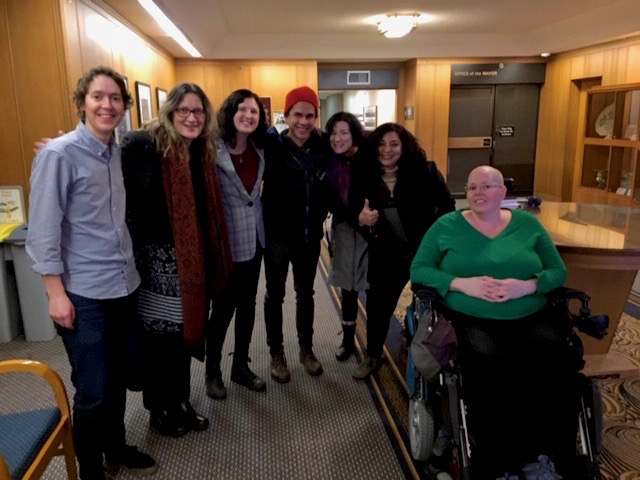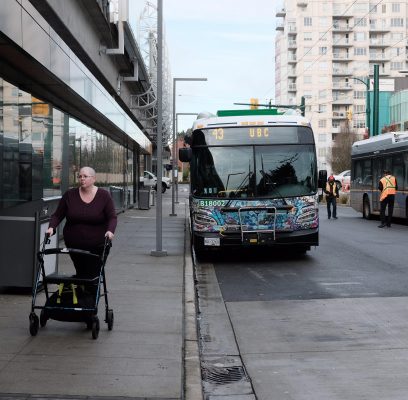In 2005, Citizens for Accessible Neighbourhoods (now Creating Accessible Neighbourhoods) was founded because of transportation issues. See our origin story for details.
TransLink and BC Transit
Creating Accessible Neighbourhoods has been consulting with TransLink since we founded in 2005. We have performed accessibility audits of SkyTrain platforms, including doing audits of all Evergreen Line stations prior to its start date. We have provided access information across all forms of TransLink transportation: bus, SkyTrain, SeaBus, West Coast Express, and HandyDART. CAN has, and continues to, provide information about how to increase accessibility for all users, including wayfinding (signage and directional cues), shelters and seating, transit stop accessibility, driver training, communication, elevators, snow removal, and more.
CAN has also advocated on behalf of members who were experiencing issues with TransLink, a few examples include following up on passenger’s bad driver experiences, speaking about transit safety, and organizing a community to hold off their bus from being rerouted.
Creating Accessible Neighbourhoods strongly believes that accessible transportation to vital to all communities. As such, we have not just worked with transportation agencies and organizations in Metro Vancouver, we have also represented disabled transit users on Vancouver Island and into the Similkameen region.

#AllOnBoard
Transit affordability is extremely important to overall access to transit options, as such, CAN is a proud partner of #AllOnBoard, who stand “for affordable and accessible transit based on income for all transit systems in British Columbia to ensure our communities can access public transit to live, work and thrive.” The three goals of #AllOnBoard are: Free transit for all children and youth 0-18, Sliding scale monthly pass system based on income, Immediate end to the fare evasion ticketing of minors, and the introduction of community service and restorative justice options for adults as an alternative to fare evasion tickets in all transit systems in British Columbia.
CAN is proud to have spoken on behalf of our members and #AllOnBoard to three city councils as well as many individual and community meetings. It is vital that affordable, equitable transportation is available and we will continue to work on this issue until it is achieved. We are currently planning a conference with #AllOnBoard to raise awareness about the need for equitable approaches to transportation in BC.

Taxi and RideHailing Training
Over the years, our transportation focus expanded and we started working on taxi accessibility and disability awareness. We became connected with Justice Institute where we have provided the content for on taxi driver training and RideHail driver training. We also did a contract for Uber in Toronto, supplying them with disability awareness materials for their drivers.

The Driver Education Centre at the Justice Institute of British Columbia (JIBC) has partnered with Creating Accessible Neighbourhoods to improve its course offerings for the TaxiHost program and other driver training curriculum. Working with Heather greatly improved our ability to provide detailed tips and strategies for service providers to ensure they are able to effectively provide universal access to all clients. Creating Accessible Neighbourhoods has worked tirelessly in the field of advocacy and education to champion the rights of persons with disabilities and other groups that often face discrimination in the services we all depend upon. JIBC greatly appreciates Heather for her invaluable advice and Creating Accessible Neighborhoods for its assistance in this area.
Driver Education Centre, Justice Institute of British Columbia (JIBC)

